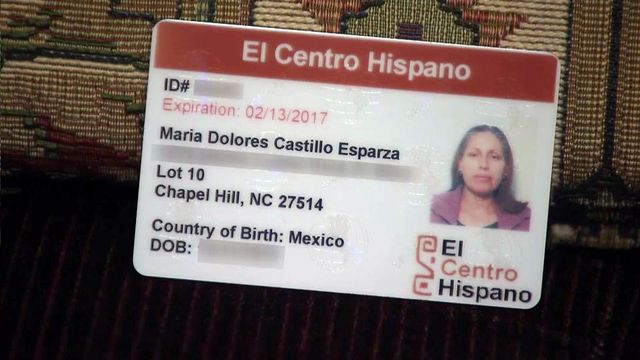Immigrant advocates, some police say local IDs needed
Thousands of North Carolina residents who lack government-issued identification get by with IDs issued by community groups, but a proposal in the legislature could soon punish cities and counties that accept so-called "FaithAction IDs."
Posted — UpdatedAlthough the 2015 law outlawed use of IDs issued by local governments or nonprofits as a form of official identification, it carved out an exception for law enforcement officers to determine someone's identity or residency if no other means were available. Senate Bill 868 would eliminate that exception.
Latino advocacy group El Centro Hispano says more than 5,000 FaithAction IDs – they're named after the Greensboro group that first issued them in 2013 – are being used across North Carolina. Prohibiting their use would hurt both undocumented individuals and law enforcement, said Judith Montenegro, director of community organizing for El Centro Hispano.
"It's a form of not only providing a space for someone to have the dignity, to have an identification, but also to feel comfortable and also have trust with law enforcement," Montenegro said. "It’s about promoting community policing, looking at people with dignity and saying, 'We see you. We know who you are,' and having law enforcement do the same."
Chapel Hill police officers have no problem using non-government IDs from crime victims and witnesses, Police Chief Chris Blue said.
"It can give law enforcement either a place to start in an investigation or might serve as satisfactory in a routine encounter," Blue said. "It's not without its drawbacks, but it's better than nothing."
Sen. Andrew Brock, R-Davie, said he believes FaithAction IDs encourage illegal immigration, so he is co-sponsoring Senate Bill 868 to put teeth into last year's law.
"We have people who are coming over and causing problems illegally. We have cities that are trying to be sanctuary cities, and it has become a haven for illegal immigrants and criminals."
Under the bill, the state would withhold public school building capital funding and Powell funding for city streets from any local government that violates the sanctuary city ban. The money would be forfeited for at least a year, until the city or county complied with the state law.
"We're trying to get a sense of accountability of who has what card and to make sure that people are here legally and we make sure that we can screen the people," Brock said. "We need to make sure who is coming in, and I think that’s one reason we’re looking at the card, that we want to make sure we have people here legally."
Sen. Floyd McKissick, D-Durham, said he has no concerns that FaithAction IDs are being misused.
"We want to do all that we can to protect the rights and interests of all people here. It doesn’t make a difference how they got here. If they have an ID card that they can present to identify who they are, it makes them less susceptible to be victims of crimes." McKissick said. "The response I’ve received is that the ID cards ought to be used within respective cities or counties that would like to use them."
• Credits
Copyright 2024 by Capitol Broadcasting Company. All rights reserved. This material may not be published, broadcast, rewritten or redistributed.






